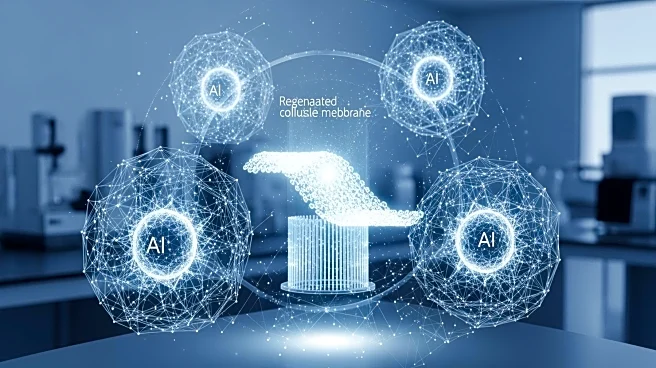What's Happening?
Scientists at Rensselaer Polytechnic Institute (RPI) in New York have developed a new technique for purifying mRNA therapies using regenerated cellulose (RC) membranes. This method has been shown to outperform
traditional chromatography columns in removing impurities from mRNA molecules, which are significantly larger than typical monoclonal antibodies. The RC membrane, equipped with peptide ligands, selectively binds to specific sections of the mRNA molecule, allowing for efficient purification. This advancement is expected to speed up mRNA production and reduce costs, as the membrane is faster and more efficient than existing methods. The team, led by Georges Belfort, PhD, is seeking industry collaborators to commercialize the process.
Why It's Important?
The development of a more efficient mRNA purification technique is crucial for the pharmaceutical industry, particularly in the production of mRNA vaccines and therapies. By reducing production costs and increasing efficiency, this innovation could make mRNA-based treatments more accessible and affordable. This is particularly significant as mRNA technology, initially developed for COVID-19 vaccines, is being repurposed for personalized cancer therapies. The ability to purify mRNA more effectively could accelerate the development and deployment of these therapies, benefiting patients and healthcare providers alike.
What's Next?
The research team at RPI is actively seeking industry partners to help refine and commercialize their purification process. This collaboration could lead to widespread adoption of the RC membrane technique in mRNA production, potentially transforming the industry standard. As the team applies for a patent, the next steps will involve scaling up the process and integrating it into existing production lines. The success of this initiative could pave the way for further innovations in mRNA technology and its applications in medicine.
Beyond the Headlines
The use of regenerated cellulose membranes in mRNA purification highlights the importance of interdisciplinary collaboration in scientific research. By combining expertise in chemical engineering and biotechnology, the RPI team has developed a novel solution to a longstanding problem in mRNA production. This approach underscores the potential for similar breakthroughs in other areas of bioprocessing, where efficiency and cost-effectiveness are critical.








